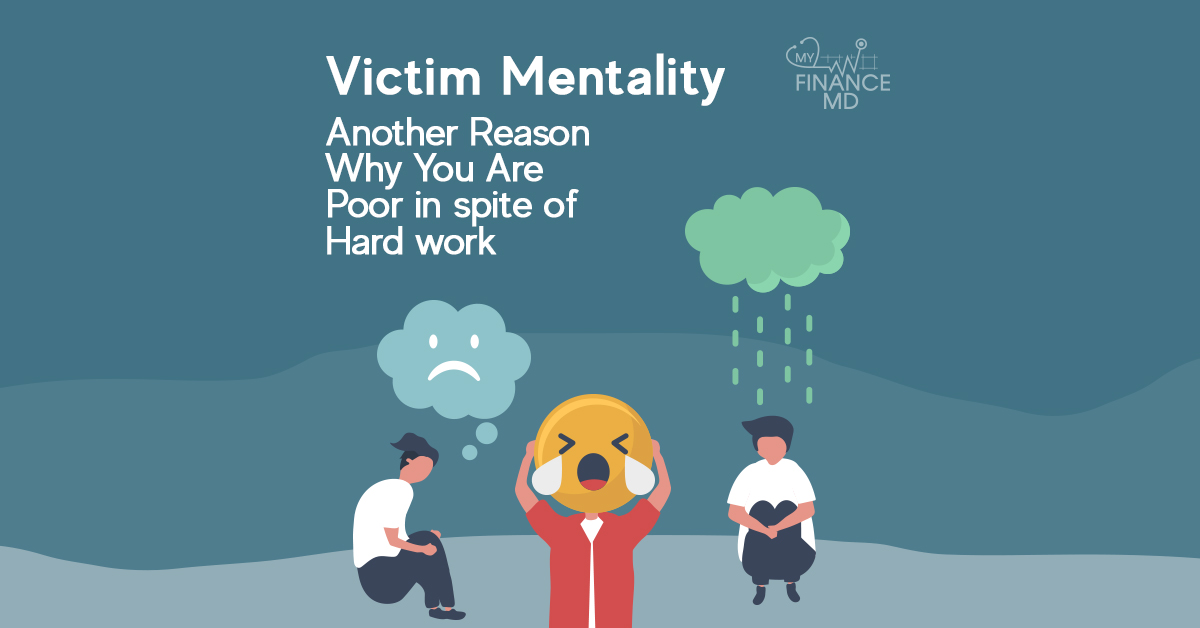
Prof Manfred F. R. Kets de Vries says that someone with a victim mentality feels that he or she is always at a disadvantage because of other people’s machinations or lack of consideration.
Here are the signs you have a VICTIM MENTALITY:
1. You frequently blame others when things go wrong, or if you don’t achieve a goal or target.
E.g. “I have poor parents, that’s why I am not rich, I am not given much opportunity.”
2. Your conversations tend to be centered around your problems, with an expectation that others will feel sorry for you.
E.g. “My husband is a poor provider and has a lot of vices. I feel sorry for myself.”
3. You may reject the chance to join in some fun workplace activities, or may refuse to admit that you are enjoying yourself.
4. You often imply that other people have an easier route to success, because they are given better tasks or preferential treatment.
E.g. They have rich parents, hence, better opportunities; it’s easier for them to become rich.
This may be true, yes, but you don’t need to feel sorry your parents are not rich.
If you checked 1 or more of these signs, that could mean you have a VICTIM MENTALITY.
T. Harv Eker of the Secrets to a Millionaire Mind tells that:
“If you want to be financially successful, you have to internalize the idea that you are the one in control of your own financial life.
Rich people know they’re at the wheel, while financially weaker people are always in the back seat, yielding control over their income to others.
That’s the reason why people who are already poor will often spend half their salary on lottery tickets, hoping to get lucky and hit the big time. Rich people, by contrast, don’t gamble to get rich or wait for wealth to fall in their laps.”
Poor people frequently put themselves in the role of victim and blame anyone it can – can be the government, their employer or their parents or even the economic situation.
If Having a Victim Mentality will Keep you Poor, then why is it, many are still a VICTIM of this Mentality?
Let’s admit it, having this mentality will have its benefits and these are: (source: positivityblog)
- Attention and validation. You can always get good feelings from other people as they are concerned about you and try to help you out. On the other hand, it may not last for that long as people get tired of it.
- You don’t have to take risks. When you feel like a victim you tend to not take action and then you don’t have to risk; for example rejection or failure.
- Don’t have to take heavy responsibility. Taking responsibility for you own life can be hard work, you have to make difficult decisions and it is just heavy sometimes. In the short term it can feel like the easier choice to not take personal responsibility.
- It makes you feel right. When you feel like the victim and like everyone else – or just someone else – is wrong and you are right then that can lead to pleasurable feelings.
What do you do to be free from this Victim Mentality?
To break that victim mentality, it also means you have to give up the benefits above.
You might also experience a sort of emptiness within when you let go of victim thinking. But it will definitely be worth it. I am sure.
Here are actionable steps:
1. Take responsibility for your life.
Life is a choice. Wherever you are right now, is the product of the choices you made in your life. And it is not other people’s choices. Stop blaming circumstances and start claiming responsibility of what your life is supposed to be.
The results you have in your life right now came from the choices you have made and not about circumstances.
2. Be Grateful.
Your situation is definitely not the worst, anyone could ever have. Look around you, how lucky you are?
Snap out of your inner voice saying, “poor me…” Look how much you should be grateful in your life.
Write 5-10 things you are grateful each day. Focus on how blessed you are and not how miserable you are.
3. Forgive
Yes, someone may have wronged you and you really became a victim. But if you hold resentment toward the other, you keep yourself trapped and continuously allowing yourself to stay a victim.
Catherine Ponder:
“When you hold resentment toward another, you are bound to that person or condition by an emotional link that is stronger than steel. Forgiveness is the only way to dissolve that link and get free.”
When you forgive you do not only release the other person. You set yourself free too from all of that agony.
4. Don’t be too hard on yourself
You can become a victim of your own self by being too hard on yourself. Give yourself a break.
Getting out of the victim mentality can be hard.
Yes, sometimes, it’s ok to be a victim once in a while. I sometimes indulge myself on that. But I put a timer. In 5 minutes I will stop feeling like a victim and I try to see:
“What is the hidden opportunity or wisdom can I get from this situation?”
STOP being a victim. START claiming your power. Be a person of commitment and not circumstances.
For Your Financial Health,

Read More:
- Your Scarcity Mindset is Keeping you Poor in Spite of Hardwork
- 5 Common Mistakes Doctors Make when Borrowing Money
- How to “KonMari” your Finances
Latest posts by Pinky De Leon-Intal, MD, RFC (see all)
- Say Goodbye to Chronic Lifestyle Diseases (Hypertension, Diabetes, Cancer, Gout, etc.) with Right Food and Right Water - 23 May, 2023
- Embracing Superpowers: A Mom’s Journey as a Doctor, Professor, and Financial Consultant - 19 May, 2023
- Celebrating the Power of Women: Honored by Philippine Daily Inquirer - 17 May, 2023

